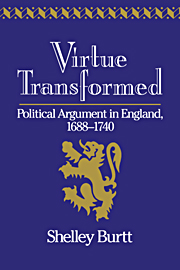Book contents
- Frontmatter
- Contents
- Acknowledgements
- 1 Introduction
- 2 The politics of virtue in Augustan England
- 3 A religious politics of virtue: Low Church Anglicanism and the Societies for Reformation of Manners
- 4 A republican politics of virtue: The selfish citizen in Cato's Letters
- 5 Bolingbroke's politics of virtue
- 6 The Court Whig conception of civic virtue
- 7 A world without virtue: Mandeville's social and political thought
- 8 Virtue transformed
- Bibliography
- Index
6 - The Court Whig conception of civic virtue
Published online by Cambridge University Press: 24 October 2009
- Frontmatter
- Contents
- Acknowledgements
- 1 Introduction
- 2 The politics of virtue in Augustan England
- 3 A religious politics of virtue: Low Church Anglicanism and the Societies for Reformation of Manners
- 4 A republican politics of virtue: The selfish citizen in Cato's Letters
- 5 Bolingbroke's politics of virtue
- 6 The Court Whig conception of civic virtue
- 7 A world without virtue: Mandeville's social and political thought
- 8 Virtue transformed
- Bibliography
- Index
Summary
Whatever the accuracy of the portrait, the bleak picture painted by Bolingbroke of a citizenry and constitution corrupted by a power-hungry ministry crystallized some of the more potent themes of opposition polemic in the early eighteenth century. Since its formation in the previous century, the Country opposition had complained that the distribution of places, pensions and electoral bribes threatened to establish a parliament perfectly submissive to the Crown's pleasure at the expense of liberty, good government and public virtue. Walpole's aggressive use of patronage to consolidate his position, his unprecedented centralization of power in the office of the Treasury and the carefully marshaled influence exercised in his behalf in the nation's elections only lent new force to these opposition accusations. Any Whig victory in the pitched propaganda battle waged throughout this period would thus depend on Walpole's mounting a vigorous and convincing response to such charges.
To defend his policies against the Craftsman's weekly barrage of criticism, Walpole relied on a diverse group of pro-ministerial writers that included a number of bishops, a lord (Hervey), a sibling (Horace Walpole), an Irishman (Matthew Concanen), dissenters (James Pitt) and one-half of the “illustrious Cato” (Thomas Gordon, who accepted a profitable government post soon after Trenchard's death). From their pens flowed a steady stream of proministerial propaganda and anti-opposition polemic which raged far beyond the single issue of parliamentary corruption. When the Craftsman called for war against Spain, they made the case for Walpole's policy of accommodation and peace. They also defended the administration's handling of the public debt and the “standing army,” while reminding readers of the flourishing state of domestic and international trade.
- Type
- Chapter
- Information
- Virtue TransformedPolitical Argument in England, 1688–1740, pp. 110 - 127Publisher: Cambridge University PressPrint publication year: 1992

